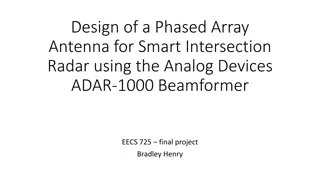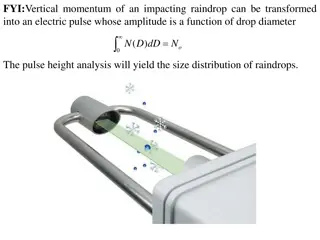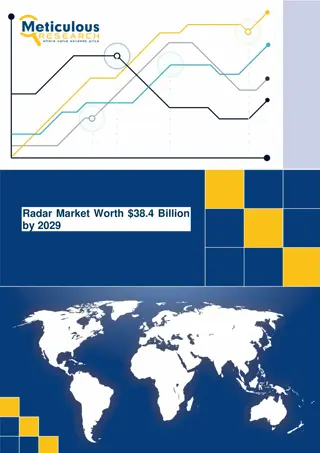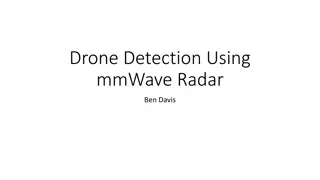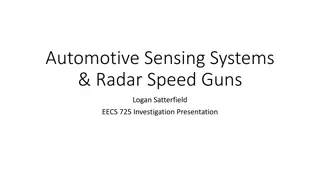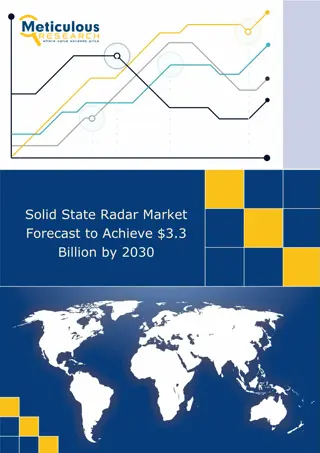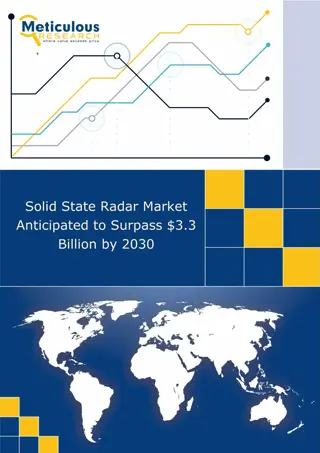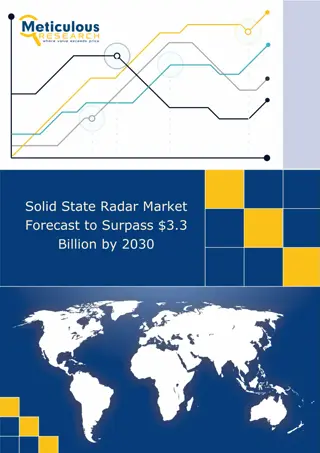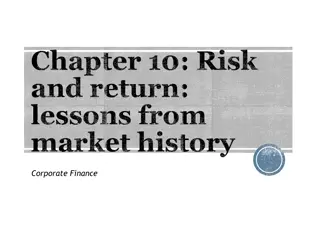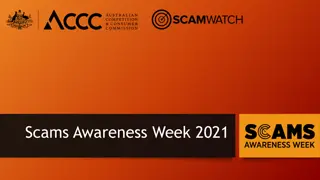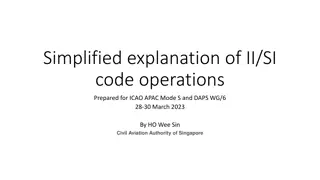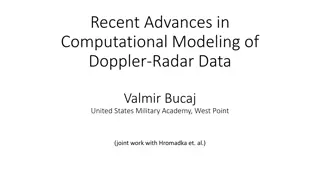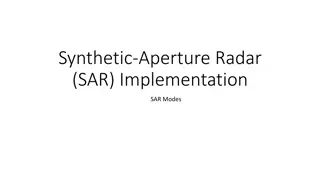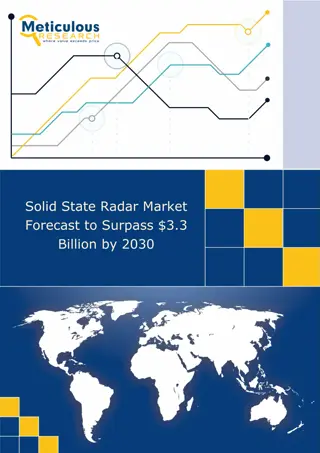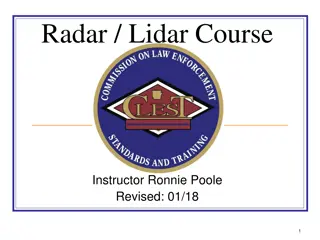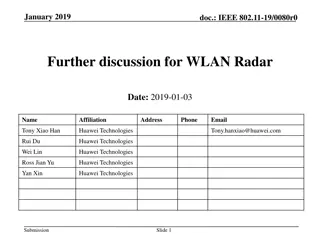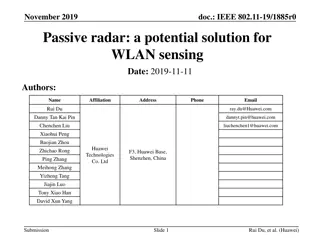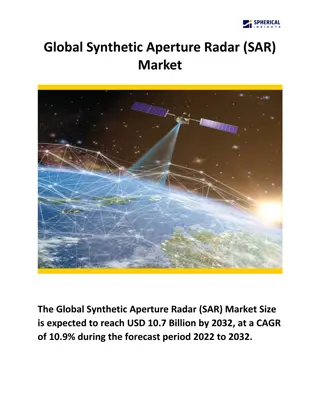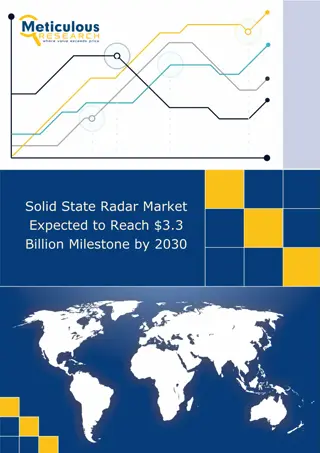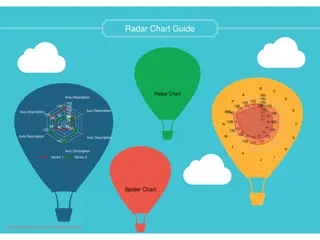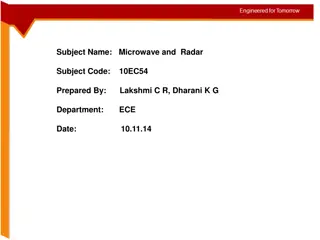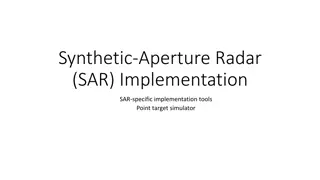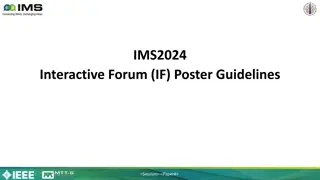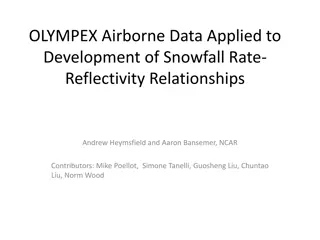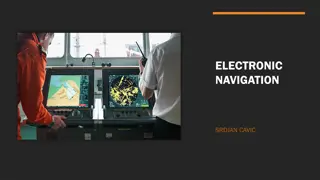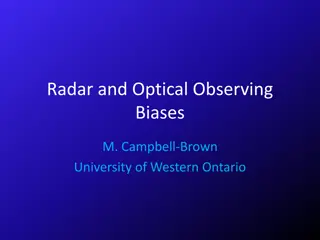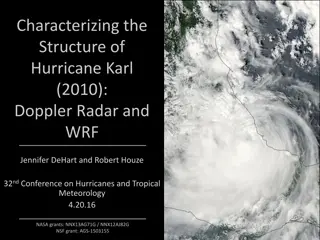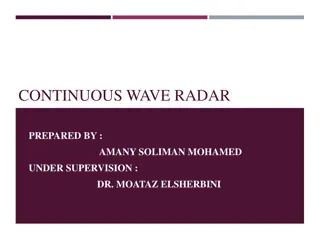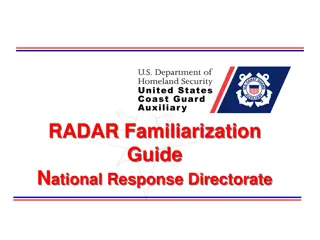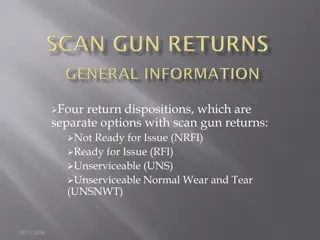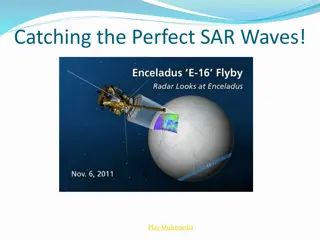Radar Attenuation Tomography for Mapping Englacial Temperature Distributions
Radar Attenuation Tomography is used to map the temperature distributions within the ice sheet by analyzing the radio waves' attenuation properties. This study focuses on the Eastern Shear Margin of Thwaites Glacier, where fast-moving ice meets slower ice, impacting ice rheology influenced by temper
4 views • 18 slides
Phased Array Antenna Design for Smart Intersection Radar Using Analog Devices ADAR-1000
Designing a phased array antenna system for a smart intersection radar project utilizing the Analog Devices ADAR-1000 beamformer. The system involves 4 independent phased arrays covering key directions in the intersection, with considerations for beam steering, beamwidth, and array configuration. Ke
0 views • 9 slides
Advancing Radar Science: Open-Source Collaboration for Precipitation Estimation
Explore the innovative work presented at the Open Radar Science in SAIL conference featuring collaborative research, open-source tools like Py-ART and Xradar, and value-added products enhancing quantitative precipitation estimates. Learn about CMAC, SQUIRE, and other techniques for radar data proces
2 views • 10 slides
Insights into Raindrop Size Distribution and Precipitation Intensity through Radar Technology
Vertical momentum of impacting raindrops can be converted into an electric pulse to analyze raindrop size distribution. Disdrometers using video cameras can directly count raindrops for sizing. Radar technology provides superior data on precipitation accumulation and intensity by measuring radar ref
4 views • 9 slides
BTH/OTH Radar and Maritime Surveillance Radar Overview
The article discusses BTH/OTH radar systems and maritime surveillance radars, exploring their functionalities, benefits, drawbacks, and real-world examples. It delves into the working principles of OTH radar, showcasing how it operates through the ionosphere. Additionally, it covers the concept of m
5 views • 12 slides
Radar Market Worth $38.4 Billion by 2029
The Radar Market by Type, Dimension Type, Frequency Band Type, Installation Type, End-user, and Geography\u2014Global Forecast to 2029.
5 views • 3 slides
Redefining Radar: Solid State Market Anticipated to Hit $3.3 Billion by 2030
Meticulous Research\u00ae\u2014a leading global market research company, published a research report titled, \u2018Solid State Radar Market by Frequency Band, Dimension, Waveform, Application, and End User (Automotive, Aviation, and Other End User), and Geography - Global Forecast to 2030.\u2019
6 views • 3 slides
Drone Detection Using mmWave Radar for Effective Surveillance
Utilizing mmWave radar technology for drone detection offers solutions to concerns such as surveillance, drug smuggling, hostile intent, and invasion of privacy. The compact and cost-effective mmWave radar systems enable efficient detection and classification of drones, including those with minimal
0 views • 8 slides
Automotive Sensing Systems & Radar Technology Overview
Explore the world of automotive sensing systems and radar technology including radar speed guns. Learn about the sensors used in cars for various applications such as radar cruise control, collision detection, and more. Discover the characteristics of these sensors and how they can be augmented or r
0 views • 7 slides
Solid State Radar Market Forecast to Achieve $3.3 Billion by 2030
Meticulous Research\u00ae\u2014a leading global market research company, published a research report titled, \n\u2018Solid State Radar Market by Frequency Band, Dimension, Waveform, Application, and End User (Automotive, \nAviation, and Other End User), and Geography - Global Forecast to 2030.\u2019
2 views • 3 slides
Solid State Radar Market Anticipated to Surpass $3.3 Billion by 2030
Meticulous Research\u00ae\u2014a leading global market research company, published a research report titled, \n\u2018Solid State Radar Market by Frequency Band, Dimension, Waveform, Application, and End User\n (Automotive, Aviation, and Other End User), and Geography - Global Forecast to 2030.\u2019
0 views • 3 slides
Solid State Radar Market Forecast to Surpass $3.3 Billion by 2030
Meticulous Research\u00ae\u2014a leading global market research company, published a research report titled, \n\u2018Solid State Radar Market by Frequency Band, Dimension, Waveform, Application, and End User (Automotive,\n Aviation, and Other End User), and Geography - Global Forecast to 2030.\u2019
1 views • 3 slides
Understanding the Concept of Return to Factor in Production Economics
Return to Factor is a key concept in production economics that explains the relationship between variable inputs like labor and total production output. The concept is based on the three stages of production - increasing returns, diminishing returns, and negative returns. By analyzing the behavior o
0 views • 7 slides
Understanding Risk and Return in Corporate Finance
Exploring risk and return in market history is crucial for determining appropriate returns on assets. By analyzing dollar returns, percentage returns, holding period returns, and capital market returns, investors can grasp the risk-return tradeoff. Lessons from capital market return history emphasiz
4 views • 18 slides
Scams Awareness Week 2021: Real or Fake Scam Radar Activity
This post discusses Scams Awareness Week 2021 and presents an interactive activity to test your scam radar. It includes images where you have to distinguish between real and scam content. Additionally, it highlights the role of Scamwatch in combating scams, recent scam trends like phishing and inves
1 views • 26 slides
Understanding Mode-S Radar Operations and Identifiers
This simplified explanation delves into the fundamental principles of radar operations, focusing on Primary and Secondary radar systems, including Mode A/C and Mode S functionalities. It covers radar interrogation, replies, and the significance of radar identifiers (II and SI codes) in managing over
0 views • 19 slides
Recent Advances in Computational Doppler Radar Data Modeling
Explore the latest developments in computational modeling of Doppler radar data, focusing on error estimation, dual vs. single pol radars comparison, uncertainty quantification, and methodology for analyzing Doppler radar predictions against gauge measurements. The study involves data from multiple
0 views • 40 slides
Understanding Synthetic Aperture Radar (SAR) Modes and Implementations
Explore the world of Synthetic Aperture Radar (SAR) through various modes and implementations, covering topics such as SAR coordinate systems, pulse compression, range-Doppler algorithms, Born approximation, SAR scene simulation, and more. Dive into the distinctions between unfocused SAR and focused
0 views • 18 slides
Solid State Radar Industry Poised to Reach $3.3 Billion Milestone by 2030
Meticulous Research\u00ae\u2014a leading global market research company, published a research report titled,\n \u2018Solid State Radar Market by Frequency Band, Dimension, Waveform, Application, and End User\n (Automotive, Aviation, and Other End Use
0 views • 3 slides
Radar and Lidar Course Legal Requirements in Arkansas
This content provides information on the legal considerations, training requirements, and regulations for radar and lidar operators in Arkansas, as well as the criteria for CLEST certification. It covers statutes related to operator qualifications, speed trap laws, and the issuance of operator certi
0 views • 187 slides
Radar Function Integration in WLAN: January 2019 Discussion
The January 2019 document IEEE 802.11-19/0080r0 explores integrating radar functions into WLAN to enhance coexistence. The proposal outlines various options, including modified schemes and dedicated indication methods for radar operation within WLAN frameworks. It emphasizes the need for feedback on
3 views • 12 slides
Passive Radar for WLAN Sensing in Indoor Scenarios
Radar and CSI have been proposed as potential WLAN sensing techniques. This document focuses on passive radar at 5 GHz in indoor scenarios, discussing background, experimental results, signal processing techniques, and potential impacts on WLAN standards.
6 views • 15 slides
Understanding GST Returns: Types, Benefits, and Mechanisms
GST returns play a crucial role in the tax system by providing necessary information to the government in a specific format. They include details of outward and inward supplies, ITC availed, tax payable, and more. Filing returns ensures timely transfer of information, aids in tax liability determina
4 views • 38 slides
WLAN-Based Radars in the 60GHz Band Using IEEE 802.11-19/1854r0 Protocol
Utilizing IEEE 802.11ad/11ay devices, this presentation demonstrates how radar applications can be implemented with minimal hardware modifications, showcasing enhanced radar information accuracy through device collaboration. The advantages of the 60GHz band for short-range radar applications, such a
0 views • 14 slides
Global Synthetic Aperture Radar
\"The Global Synthetic Aperture Radar (SAR) Market Size is expected to reach USD 10.7 Billion by 2032, at a CAGR of 10.9% during the forecast period 2022 to 2032. \n\n\"\n
0 views • 5 slides
Solid State Radar Market Expected to Climb to $3.3 Billion by 2030
Meticulous Research\u00ae\u2014a leading global market research company, published a research report titled, \u2018Solid State Radar Market by Frequency Band, Dimension, Waveform, Application, and End User (Automotive, Aviation, and Other End User),
0 views • 3 slides
Complete Guide to Radar Charts: Benefits, Drawbacks, and Tips
Radar charts, also known as spider charts, offer a graphical way to compare data in a web-like form, making it easy to evaluate multiple alternatives based on various criteria. While radar charts have benefits like highlighting strengths and deficiencies clearly, they also come with drawbacks such a
0 views • 12 slides
Understanding Microwave Diodes and Transfer Electron Devices in Radar Systems
Explore the world of microwave diodes and transfer electron devices (TED) in radar technology. Learn about Gunn diodes, Gunn effect, RWH theory, and differential negative resistance. Discover how TEDs operate with hot electrons and the critical voltages involved. Dive into the fascinating concepts b
1 views • 34 slides
Understanding Interpolation Techniques for Synthetic Aperture Radar (SAR) Implementation
Dive into the world of Synthetic Aperture Radar (SAR) implementation tools and techniques, including resampling methods, interpolation of band-limited signals, and the analysis of SAR-specific algorithms like range Doppler and chirp scaling. Explore how resampling algorithms enable non-uniform sampl
0 views • 35 slides
Development of Reconfigurable Low Cost Multi-Mode Radar System for Vital Signs Detection
This project focuses on creating a reconfigurable radar system for contactless vital signs monitoring. By utilizing a hybrid approach of UWB and CW modes, the system aims to achieve high sensitivity and resolution with minimal size, weight, and power consumption. The innovative design allows for mul
0 views • 4 slides
OLYMPEX Airborne Data Analysis for Snowfall Rate-Reflectivity Relationships
Utilizing Citation aircraft data from OLYMPEX, this study focuses on developing relationships between snowfall (rainfall) rate and radar reflectivity across various radar bands. Comparisons are made between in-situ aircraft data and retrieval products from CloudSat, GPM, and TRMM datasets. Results i
0 views • 12 slides
Exploring Electronic Navigation Technologies
Electronic navigation technologies, such as satellite navigation, radio navigation, and radar navigation, utilize electricity-powered systems for precise positioning and tracking. Satellite navigation systems rely on signals from satellites for autonomous geo-spatial positioning, while radio navigat
0 views • 9 slides
Understanding Radar and Optical Observing Biases in Meteor Detection
Exploring radar and optical observing biases in meteor detection, this content delves into factors affecting mass detection, ionization efficiency, transverse radar effects, and more. Gain insights into how radar technology plays a crucial role in determining meteor properties and overcoming observa
1 views • 13 slides
Analyzing Hurricane Karl (2010): Doppler Radar Insights
Detailed analysis of Hurricane Karl (2010) using Doppler radar and WRF simulations, focusing on precipitation patterns over Mexican terrain and underlying processes. Includes NASA and NOAA grants, airborne radar measurements, WRF simulations, flight tracks, and velocity distributions comparison betw
0 views • 19 slides
Continuous Wave Radar Systems Overview
This presentation discusses Continuous Wave radar systems, including types of radar such as CW and FM-CW systems, as well as advantages and disadvantages of CW radar. It covers topics like CW radar operation, receiver technologies, and the Doppler effect in CW radar. The content provides a comprehen
0 views • 10 slides
Radar Familiarization Guide for Surface Operations: Understanding How Radar Works
This radar familiarization guide by the National Response Directorate provides important information on the proper use of radar equipment, including its basic principles, functions, and practical applications for surface operations. It emphasizes the significance of radar in ensuring safe navigation
0 views • 47 slides
Understanding Return Dispositions and Remote Returns Process in Warehousing
Explore the concept of return dispositions like NRFI, RFI, UNS, and UNSNWT in warehouse management, along with insights into Remote Returns Process (RRP) nodes and Non-RRP nodes. Learn about Regular Returns, LPNs, and the choice between consolidating returns with LPNs for efficiency. Understand the
0 views • 11 slides
Understanding Electromagnetic Waves and Radar Systems
Dive into the world of electromagnetic waves and radar systems with detailed explanations on wave basics, the electromagnetic spectrum, radar technology, and applications in geometry. Discover how radio waves are used in radar systems and the importance of electromagnetic energy in modern engineerin
0 views • 13 slides
Human Activity Recognition from Millimeter-Wave Radar Point Clouds
Accurate human activity recognition (HAR) is crucial for context-aware applications. This study presents a framework utilizing mmWave radar-generated point clouds for HAR, addressing challenges related to privacy and sensors. Different machine learning approaches were evaluated, and a new open-sourc
0 views • 11 slides
Tracking and Identifying People with Millimeter Wave Radar
This study presents a human tracking and identification system using mmWave radar technology, offering high precision and the ability to conceal behind materials. The system achieved a median tracking accuracy of 0.16m and an identification accuracy of 89% for 12 individuals. Unlike traditional meth
0 views • 12 slides

